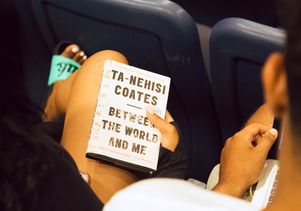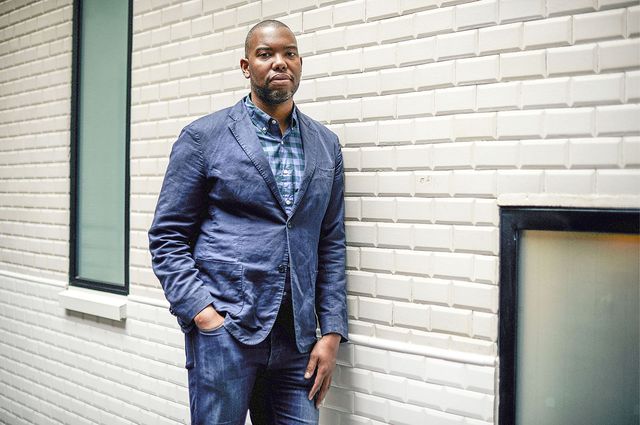Incoming UCLA freshmen and transfer students got a jump start into examining concepts of social justice and personal activism during their first week on campus, thanks to the eighth annual Common Book program, which is administered by the First-Year Experience staff from the UCLA Office of Residential Life.
This year’s Common Book selection, “Between the World and Me,” is a searing, critically acclaimed essay on black life in modern America written by famed journalist Ta-Nehisi Coates in the form of a letter to his teenage son. After reading the book over the summer, new students participated in activities last week aimed at deepening their engagement with Coates’ thought-provoking insight. Common Book and First-Year Experience staff also will collaborate year-round with professors and organizations from across campus to insert the book and its themes into curricula, special events and projects.

Every Common Book is specifically chosen to instigate dialogue around issues of social justice, said Carmen Garcia-Shushtari, who has been leading the program for the last five years.
“That is one of the goals of the program,” she said. “Every year is very different. The chosen book really changes the personality of the program each time.”
This year’s selection was particularly potent, Garcia-Shushtari noted. With police shootings, protests and the Black Lives Matter movement pervading traditional and social media, students are already aware and tuned into the issues that Coates navigates.
The evening before classes started last week, hundreds of students gathered in groups in the residence halls they now call home to talk about pervasive issues confronting the public consciousness — issues of race, identity and police violence. They shared hopes and frustrations around the concepts of diversity, inclusion and activism, as seen through the lens of their personal backgrounds, but with eagerness to learn more during their forthcoming university experience.
Book discussion groups were led by resident advisers, who received training on how to conduct the conversations in an inclusive way.
After the small-group chats, students on the Hill were invited to attend a panel discussion about the book to further explore Coates’ approach to addressing the struggles, fears and anger among African-Americans at what he calls the plunder of black bodies that is inherent in the history and evolution of American policy and institutions. Presenters talked about the ways these struggles and fears can affect our own campus.
“We must all think about who we are in the face of persistent anti-blackness,” said Safiya Noble, UCLA professor in the graduate school of education and information studies, addressing students before the panel discussion began. Noble includes Coates’ book as required reading in her course titled “Information and Power.”
Engaging with challenging and complex writing that tells personal and individual stories of struggle is an important skill to cultivate both as members of an academic community and as individuals living in a multicultural democracy, Noble said.
Invited panelists included Artel Great, a UCLA graduate and the first African-American valedictorian from the School of Theater, Film and Television. He is currently a doctoral student at NYU Tisch School of the Arts and founder of Project Catalyst, a community-building app that supports diversity in film and other artistic projects.
His fellow panelists were UCLA undergrad Jendi Priscilla Samai, a first-generation Sierra Leonian-American, who is exploring issues of race and diasporic identities in her honors thesis; and Marques Vestal, doctoral student in history at UCLA and one of the founders of The Undercommons, a campus group recently created to spark dialogue around what public education means and how working-class black, native and other people of color can achieve liberation in a world of diverse genders, sexualities and abilities.
Panel members talked about the elements of Coates’ book that drew them in as well as those they found lacking. They also each shared personal stories — some joyful, some rueful, some grim — from their experiences as African-Americans, especially as underrepresented students on campus.
Panelists passionately urged the incoming students to think critically about what they are taught, as well as about issues that arise in society. They also advised students who may feel out of place to “find their own mecca” in one another, both by seeking out people who share some of their life experiences as well as engaging with others who are eager to understand cultural differences.
UCLA is a place where individuals can discover their own activist voice, panelists said, especially thanks to a growing number of faculty whose presence on campus highlights UCLA’s commitment to the cause of social justice and activist research.
This year’s upcoming Common Book-related projects include interactive art and movement workshops developed with Center for the Art of Performance at UCLA and its student arm, the Student Committee for the Arts; an exhibition at the Hammer Museum; a zine-making workshop under the “What is Your Mecca?” theme with the UCLA Library; the “Images of Blackness” speaker series sponsored by the Ralph J. Bunche Center for African American Studies at UCLA, and more.
The First Year Experience team invites faculty and staff from across campus to be part of the Common Book program by serving as ambassadors. These volunteers read the book and participate in discussion groups as a way to help introduce new students to a broad spectrum of people from UCLA.
Garcia-Shushtari says the staff hope to begin inviting recent alumni back to campus to share their memories of the Common Book from their inaugural UCLA year and inspire current students to explore and engage more deeply with the program.





